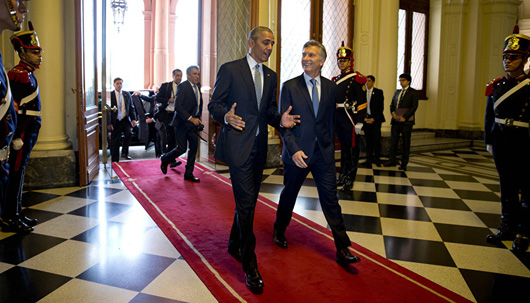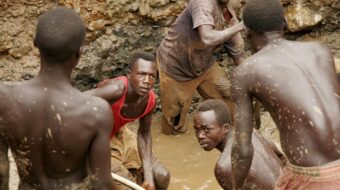
One might think that with “around 800 U.S. bases in foreign countries,” and “U.S. troops or other military personnel in about 160 foreign countries and territories,” the United States is either at war or about to be. What with the “war on terrorism” and confrontations with Russia and China, it’s true of course. But how are bases in Latin America and Africa to be explained – in Argentina, for example?
The United States has long sought to extend its military influence in Argentina. But during the presidencies of Néstor Kirchner(2003- 2007) and Cristina Fernández (2007 – 2015), there was resistance.
In 2006, “the government of Argentina decided to stop sending soldiers to train at the School of the Americas.” In 2011 at the Buenos Aires Airport, Argentinean authorities blocked U.S. nationals from unloading arms from a U. S. Defense Department airplane intended as instructional aids in U.S.-run police training courses.
In 2012, Jorge Capitanich, governor of Argentina’s Chaco province, negotiated with U.S. military attaché Edward Passmore and other embassy officials to place a $3 million U.S. Army facility in La Resistencia, on the west bank of the Paraná river in northeastern Argentina. Local protests cropped up and President Fernández rejected the project, designated as “humanitarian in nature.”
But for U.S. military planners, there’s a new day. Mauricio Macri succeeded Cristina Fernández as Argentina’s president in December 2015. His government has moved toward “free trade and an explicit alignment with US economic and foreign policy interests.” It eliminated currency exchange regulations and export taxation on most agricultural products and minerals. It fired 32,000 public sector workers and took on additional debt to satisfy older, contested obligations to U.S. creditors – the “vulture funds.”
On a state visit to Argentina in March 2016, President Obama praised Macri for efforts “to create more sustainable and inclusive economic growth, and to reconnect Argentina with the global economy and the world community.”
Thus in a spirit of refurbished bi-national relations, U.S. and Argentinian military officials held meetings at the Pentagon beginning May 18. Argentina’s Vice-Minister for Defense, Ángel Tello, and Rebecca Chavez, the U.S. Deputy Assistant Secretary of Defense for Western Hemisphere Affairs, headed the respective discussion teams.
According to Tello, agreements were reached on “collaboration in confronting humanitarian emergencies and natural disasters, peace missions under United Nations auspices, both nations’ concerns about terrorist threats, and [Argentinian] troops once more being offered instructional courses supported by the United States.” In general, “we have advanced in reforming bilateral relations broken in 2009.”
In the future there would be a U.S. role in “re-equipping [Argentina’s] armed forces”. And, crucially, the Pentagon conferees OK’d preparations for two U.S. bases in Argentina.
One is proposed for the northeastern province of Misiones, specifically for the city of San Ignacio, located on the eastern side of the Paraná River, on the opposite shore and upstream from the aforementioned base proposed for Chaco in 2012. Each is close to the “triple border” area where the boundaries of Brazil, Paraguay, and Argentina join.
That region’s strategic value derives in part from its supposed role as a home base for terrorism and from the smuggling, drug trafficking, and money-laundering endemic there. The giant Itaipú hydroelectric dam is located near the confluence of the Iguazú and Paraná rivers. And the area overlies the Guarani aquifer, the world’s largest reservoir of drinkable fresh water.
The U.S. interest in the area is hardly new. The United States had maneuvered earlier to set up a base in the province, and U.S. and Argentinian troops engaged in military exercises in Misiones in 2002.
Tello told La Nación newspaper also that “the United States has demonstrated its interest in deepening ties of cooperation in Antarctica.” He was referring to “the building of a military base in Ushuaia from which ships and airplanes engaged in ‘scientific studies’ in Antarctica could operate. Pentagon planners had long prioritized that project also.
Ushuaia, population 57,000, already an Argentinian naval base and formerly the site of a notoriously abusive prison, is the world’s southernmost city. The prospect of a U.S. base in Ushuaia provoked criticism within Argentina. Opposition congressman Matías Rodríguez, for example, noted a “U.S. interest in relying on a greater presence in the southern Atlantic, a region of great geo-strategic importance.”
Elsa Bruzzone of the Center of [retired] Soldiers for Democracy (CEMIDA) elaborated: “The United States uses various excuses such as ‘humanitarian aid,’ and help with natural disasters in order to install military bases… What they want to do is to fence off all the natural resources we have in Our America.” She added that “Antarctica is the greatest reservoir of frozen fresh water on earth, and the greatest deposits of hydrocarbons and highly strategic metals in the region are located on the Antarctica Peninsula. They are indispensable for military and aero-space manufacturing. The U. S. object is to obtain control over all our natural resources.”
The type of war U. S. militarists are waging in Argentina is now clear. A political observer a century ago studied “a colonial policy of monopolist possession of the territory of the world, which has been completely divided up.” To gain their piece, capitalists then and now have required military force, which a compliant state conveniently supplies. The observer was Lenin, who with his Imperialism: The Highest Stage of Capitalism, explains what’s going on between Argentina and the United States.
Photo: President Obama meets with Argentina’s President Mauricio Macri. | AP












Comments